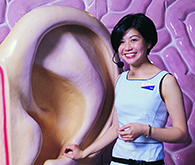New in Israel: a course to bridge the gap between science and the public opens at the Technion. The students learn how to write news for the written press and for television, how to give lectures and be interviewed. 'Hidan' and Ynet join the mission!

After all, you have an amusing task in the style of 'the beautiful and the nerdy': ask ten random people on the street what subject they would like to study at the university, if they could choose as they wished. Write down their answers on a sheet, and now summarize the results. The writer of these lines carried out the above task in Haifa and Tel Aviv and returned with the results. Before you continue to the next paragraph, you are invited to stop for a moment and guess - how many people answered that they wanted to study physics or chemistry at university?
Three people out of twenty?
Maybe just two?
And maybe one tzaddik in Sodom?
And the results (not surprisingly) are zero from zero. Nada. Gornish. Most of the respondents would like to study theater acting, economics or law. A minority of them want to study some engineering field - biotechnological engineering, mechanical engineering or electrical engineering. But nobody wants to study physics and chemistry. Basic science, it turns out, does not appeal to most people - even though almost every device we use in modern life is based on theories and developments of those sciences.
This phenomenon is recognized throughout the Western world, and it manifests itself in its most extreme manifestations in Great Britain, where entire physics departments are closed even in the most prestigious universities. In many European countries there is a consensus that action needs to be taken, to make basic science something within the reach of the common man. Even the most theoretical science can be exciting, fun and exciting, but for that you need to know how to convey it to the audience. In today's situation, most scientists are unable to explain in simple language what they do in the laboratories, and the obvious result is a disconnect between the public and science.
To bridge the gap, a new field of postgraduate studies dealing with scientific communication has been opened in the UK. Graduates of the department receive the necessary tools to spread science in the various media - on radio, television and even in pub games. Among the faculty members in the scientific communication circles is Professor Richard Dawkins, a former biologist and current prolific writer, who deals with scientific communication and an uncompromising fight against all kinds of superstitions and insipidities.
In the Holy Land there is still no complete circle for scientific communication, but one can already see the buds of blessed activity in that direction. In the current semester, a new course called 'Science in Communication: Theory and Practice' will be opened at the Technion, under the direction of Dr. Eilat Baram-Zabari from the Faculty of Technology and Science Teaching. Baram-Zabari is a new faculty member at the Technion, with many years of experience in writing, editing and appearing on television and in the press.
"The quantity and quality of popular science in the mass media in Israel is very low, and the blame is shared by both the media and the scientific community," says Baram-Zabari, "in the media, for some reason, they believe that science will not interest the Israeli public, even though the situation is different all over the world, and in the scientific community they think that if the media does not Acts according to the academic laws, is superficial and should not be cooperated with. Our interest as people for whom science is important is to learn the rules of the game of the media, and use it to convey our messages to the public."
The students in the course, who come from all the faculties at the Technion, undergo their first baptism of fire in writing scientific news for newspapers, learn how to prepare for interviews with the media, how to lecture in front of an audience and many other skills that will, hopefully, serve them in their future scientific careers. It is important to emphasize that the course can also greatly benefit academic faculty members who wish to improve their ability to communicate in front of an audience - something that will help them in receiving research grants from various committees.
During the course, the students will film a news story - and the best of them will be published on Ynet's science channel. "Hidan is an excellent source of information for anyone interested in science in Israel, and it will always have the right to be the first on the web. It would be wonderful if the students in the course could contribute to the site later on."
It is clear that Israel is still far from Britain's situation in terms of investment in scientific communication, but it is to be hoped that Baram-Zabri is the swallow that heralds the coming of spring, and that following her, similar courses will be opened in other universities in Israel.
To the website of the course in scientific communication in Australia
Previous articles on the subject on the science website:
- Scientific literacy - we must not allow a high rate of ignorance in science / Avi Blizovsky
- The problematic nature of science representations in the media - Prof. Gabi Weiman
- Eight points on the sad state of journalistic coverage in the field of science / Avi Blizovsky
- To bring the beauty of science to the public/Roi Cezana

2 תגובות
Davidson Online's website is also a wonderful source of popular science:
http://www.weizmann.ac.il/zemed/net_activities.php?cat=1639&incat=1412
Oh well, Roy, it's because you didn't do the referendum in Jerusalem. Maybe if you met me you would have at least one person for statistics who plans to study physics next year (in Hebrew, if that interests you).